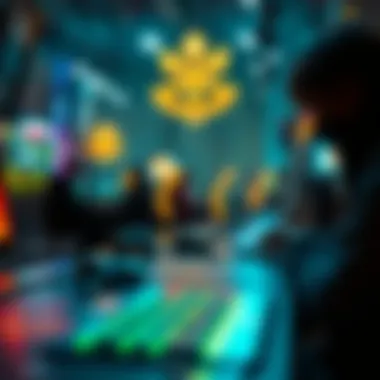Monetizing Your Experience: Trading Path of Exile Currency for Real Money


Intro
In the ever-evolving landscape of online gaming, Path of Exile stands as a unique behemoth. With its rich lore, intricate character builds, and a seemingly endless pool of loot, it’s no wonder that players are hooked. Yet, beyond the thrill of grinding for that elusive item, there lies a different realm entirely—the trading of in-game currency for real money. This article will guide you through the nuanced process of monetizing your experience in Path of Exile. While many gamers admire the virtual worlds they traverse, the question arises: how can one turn their time and effort into cold hard cash?
A Double-Edged Sword
Trading Path of Exile currency for real money is akin to walking a tightrope; it can lead to lucrative rewards, but the risks can’t be ignored. With the game’s economy as complex as the skill trees it offers, understanding how to navigate this space is paramount. Players often end up engaging in these transactions out of a desire to fund their gaming habit or alleviate financial burdens, but they have to tread lightly.
In the following sections, we will explore the motivations behind these trades, the methods available, and the ethical considerations that shadow such undertakings. The essence of this examination is not merely to highlight the sizzling prospect of profit but to provide a balanced perspective on the implications of these actions in Path of Exile’s environment.
The convergence of gaming and real-world economics has stirred discussions among developers, players, and the wider gaming community. As we evaluate these dynamics, it’s crucial to understand that beneath every transaction lies a complex web of motivations, opportunities, and potential pitfalls.
Understanding the Concept of Exchanging In-Game Currency
In the sprawling universe of gaming, particularly in titles like Path of Exile, the dynamic of exchanging in-game currency for real money signifies a multifaceted approach to monetizing virtual experience. This concept is not just about simple transactions; it encapsulates motivations, community interactions, and the ever-evolving notions of value.
When players spend countless hours grinding away in Path of Exile, collecting chaos orbs or exalted orbs, they tap into a complex economy that mirrors real-world systems. This intertwined relationship between time, effort, and reward presents an alluring opportunity for gamers to convert their digital diligence into tangible income. However, diving into this realm requires an understanding of the nuances of trading and the implications it holds for both individuals and the broader game environment.
The importance of comprehending this topic lies in the potential it has to reshape how gamers perceive their investment in time and skill. Engaging in currency exchanges can significantly affect their experiences in gameplay and the game’s ecosystem itself. For gamers looking to fatten their wallets while progressing in the game, recognizing the landscape of currency exchange becomes paramount.
Key Benefits and Considerations
- Enhances gamer experience: Currency exchange may allow players to hasten their progression, unlocking new areas and items much faster than traditional gameplay.
- Opportunity for income generation: For seasoned players, trading can serve as a secondary income stream, making time spent on gaming a bit more worthwhile.
- Market participation: Players become active participants in a nuanced economy, trading their assets, which can deepen their engagement with the game.
Nevertheless, it’s essential to approach this aspect with caution. Players must be wary of fluctuating currency values and potential pitfalls, including scams or other risks that plague this trade landscape. By grasping the concept clearly, gamers can navigate through the maze of currency trading with both respect and strategy.
Defining Path of Exile Currency
In the context of Path of Exile, currency isn't just about numbers on a screen; it represents the lifeblood of a player’s journey within the game. Various forms of currency exist, including chaos orbs, exalted orbs, fusing orbs, and others, each serving distinct purposes. Players often use these orbs to craft items, buy gear, or trade with others, making them integral to the gameplay experience.
Like a financial system, these currencies have their own supply and demand dynamics. The rarity of certain items or upgrade processes can drastically inflate their value over time, making informed trading acumen essential for anyone looking to monetize their gaming efforts.
The Appeal of Real Money Transactions
The allure of real money transactions in the gaming landscape has grown exponentially, fueled by a few key factors. Firstly, the perception of earning real income from a virtual hobby appeals to many, as it blurs the lines between leisure and livelihood. Numerous players view trading their accumulated resources not only as a way to maximize their time spent in-game but also as a legitimate means of generating income.
Moreover, many players often find themselves with excess currency that they don't need, and selling it becomes a practical solution. Why let those chaos orbs collect virtual dust when they can be transformed into real cash? The exchange process can feel like striking gold, particularly for those players who have invested time learning the intricate systems and strategies of the game.
However, while enticing, the transactions come with their unique sets of challenges. Real money trading can muddy the waters of fair play and game integrity, leading to a patchwork of community standards that players must navigate. Those engaging in this financial dance must balance profit with preserving the spirit of competitive gaming, ensuring they don't step on toes within the community they cherish.
"Engaging in currency trading can redefine a player's relationship with the game, shifting perceptions from a mere pastime to a potential income-generating venture."
Through careful consideration of the intricacies of Path of Exile's currency system and the implications of real money transactions, players can successfully venture into this evolving landscape, equipped with knowledge and strategy.
Market Dynamics and Demand
Understanding the market dynamics and demand in the context of trading Path of Exile currency for real money is crucial. This aspect influences how players monetize their gaming experience and shapes the very fabric of the game’s economy. It's not just about the want for currency; it's about examining how various factors intertwined craft the value of currency and the opportunities it presents to players. Essentially, it’s about knowing the storm before setting sail.
Supply and Demand in Digital Economies
The laws of supply and demand are as old as the hills, yet they hold true even in the digital realm. In that often-chaotic marketplace of Path of Exile, a player looking to sell their hard-gained currency must navigate a landscape where demand often outstrips supply. This can push prices for certain items extremely high, while others may dwindle in value.
For instance, when new updates drop or specific events occur, demand can skyrocket for particular currencies. Players, eager to unlock the latest content or gain an edge, will search high and low for these items. Conversely, during downtimes or lulls in game activity, prices may plummet, akin to a stock market crash. Understanding these fluctuations can lead to smart trading practices and potentially high profits.
Consider the following points:
- Event-driven Demand: Major league events or updates can drastically increase demand, leading players to engagement.
- Seasonal Changes: As patches roll into effect, some currencies might hold more relevance than their stable counterparts.
- Evolving Meta: The game's ever-changing meta also plays a part—what's hot today may turn cold tomorrow.
So, one can say that being in the know is just as valuable as the items traded. If a seller can read the tides, they can become quite adept at finding their buyer at the right time, catching the wave of demand as it crests.
Fluctuations in Currency Value


Currency in Path of Exile does not sit still like a statue; it’s more like a racehorse—fast, unpredictable, and subject to change. Variations in the value of in-game currency stem from multiple factors. Each fluctuation can be an opportunity, or a pitfall, depending on a player’s approach.
Some considerations include:
- Game Updates and Patches: When new content gets rolled out, it might influence a currency’s desirability, causing spikes or drops in its value.
- Scarcity: If a currency suddenly becomes hard to find due to an update making it less accessible, its value could jump, the same way gold nuggets might in a mining boom.
- Market Manipulation: Unfortunately, like any economy, digital currencies are subject to the whims of players who hoard currencies and later release them in bulk to manipulate prices. It’s a rogue move and can shake the market like a leaf in the wind.
Players looking to trade must remain vigilant. Tools and resources such as PoE Trade or community forums on sites like reddit.com can help players stay abreast of price shifts, much like stock market indicators. Understanding when to buy low and sell high, or to hold on to what one has, could mean the difference between a modest profit and a hefty payday.
"In the world of digital economies, knowing when to act can be as significant as the action itself."
Embracing these concepts paves the path forward, allowing the savvy player to harness the sometimes-volatile tides of Path of Exile currency for their benefit.
Methods for Trading Currency Legally
When it comes to trading Path of Exile currency, doing so in a legal framework is crucial for protecting both yourself and the integrity of the game. It minimizes the risk of penalties from the game developers and ensures a smoother transaction process. Understanding the proper methods is not only beneficial but also a necessary step to navigate this complex digital economy. Let's delve into various avenues available for players looking to monetize their in-game efforts legally.
Online Marketplaces and Platforms
The digital landscape boasts various online marketplaces where players can trade their Path of Exile currency for real money. Some of these platforms specialize in gaming currencies, providing a secure environment for players. Websites like PlayerAuctions, G2G, and EpicNPC stand out as prominent players in this arena.
These marketplaces typically operate with clear guidelines on transaction protocols, user verification, and customer support that enhance trust among users. Here are some key aspects to consider:
- Trustworthiness: It’s essential to select a reputable platform. User reviews and ratings can give you a clear sense of a market's reliability.
- Fees: Be mindful of transaction fees that these platforms may impose. They can eat into your profits unexpectedly.
- TOS Compliance: Each platform has its terms of service. Ensure you adhere to these to avoid having your account banned.
Lastly, these platforms often provide mechanisms to handle disputes, which can safeguard transactions against unforeseen issues.
Direct Player-to-Player Trading
Direct player-to-player trading is another method that allows gamers to negotiate deals among themselves without a middleman. This can be particularly advantageous as it may allow for better rates on the currency compared to going through a marketplace. However, this approach carries its own set of risks and considerations:
- Negotiation Skills: The ability to negotiate effectively can lead to better terms. It’s often a matter of finding a balance that suits both parties.
- Communication: Most trades occur via forums like Reddit, Discord, or even dedicated in-game chat. Clear communication can prevent misunderstandings.
- Safety First: Always prioritize safety; consider using a trusted intermediary or a secure payment method. There are horror stories of scams that can leave players in the lurch if they’re not careful.
It's crucial to build a reputation within these communities. A solid reputation can open more doors and make future trades smoother.
Payment Methods and Security Concerns
When trading in-game currency for real money, choosing the right payment method is vital for both security and ease of use. Popular payment options include PayPal, Skrill, and cryptocurrencies like Bitcoin. Each option has its advantages and drawbacks, so assessing them based on your needs is essential.
Here are a few points to consider regarding payment methods:
- Chargebacks: Credit cards and PayPal can allow buyers to reverse transactions. Using payment methods with limited chargeback option might protect you during a trade.
- Anonymity: Some payment methods, especially cryptocurrencies, offer more anonymity. This might be preferable to players who prioritize privacy.
- Transaction Fees: Be aware of fees associated with different payment methods, as these can add up quickly and diminish your profit margins.
Additionally, security should be top of mind. Always verify the identity of the trading partner and make sure to utilize platforms that include protections against fraud.
"Trading currency online requires knowledge and caution. Blindly jumping into any deal can lead to more trouble than it's worth."
Ensuring you maintain a sound approach in trading Path of Exile currency not only bolsters your financial return but also contributes to a respectful community environment.
Risks Associated with Currency Trading
Trading Path of Exile currency for real money can lure many players into its promising territory, yet it's not all sunshine and roses. While some individuals see this as a viable means to earn from their gaming skills, the landscape is riddled with pitfalls that could leave one high and dry. Understanding these risks is crucial for anyone considering venturing into this market, as these factors could very well impact not just one's account but also the overall gaming experience.
Potential Scams and Fraud
When dealing in in-game currency, players must be wary of scams that are all too common in the gaming community. Numerous reports have surfaced about players losing their hard-earned currency or items to deceitful schemes. Clever con artists often design sites that look like legitimate trading platforms. They lure unsuspecting players into sharing their account details or making trades that benefit the scammer more than the player.
Here are some common forms of scams to look out for:
- Phishing Attempts: Often manifested through fake websites or emails that mimic the game's official communications.
- Fake Trade Offers: Scammers might offer trades that appear too good to be true, enticing players to surrender their items for a fraction of their worth.
- Impersonation: Some players pose as moderators or support staff, tricking others into divulging sensitive account information.
To minimize risk, stay on reputable platforms and use verified channels for transactions. Keeping a sharp eye out and confirming identities can save one from falling into these traps.


Impact of Trading on Gameplay and Community
The act of trading currency can ripple through the gameplay experience and the community at large. A substantial amount of players may find benefits in trading, yet it brings along potential consequences such as imbalances within the game. When certain players gain shortcuts by purchasing powerful items or currency, it may skew the game’s intended balance.
This imbalance can lead to the following:
- Frustration Among Players: Those who prefer the traditional grind may feel underappreciated or frustrated when they encounter wealthier players who can quickly overpower them.
- Altered Game Dynamics: An influx of purchased gear can affect in-game markets, causing inflation for items that become more common due to this trading.
- Decreased Community Interaction: Rather than working together or trading among friends, players might focus solely on transactions, which reduces the sense of community.
As tempting as trading may seem, its repercussions can significantly change how players perceive and interact within the game's world.
Consequences from Developers
Developers of Path of Exile (or any similar MMORPG) have a vested interest in maintaining the integrity of their game. Many developers have policies against real-money trading, deeming it a violation of their terms of service. Players caught engaging in such transactions may face serious repercussions.
Consequences could include:
- Permanent Bans: Accounts found guilty of trading currency for real money may be permanently banned, losing all progress and investments.
- Account Rollbacks: In some cases, developers might roll back accounts, erasing the effects of the transactions.
- Fines and Legal Action: Though rare, some developers have pursued legal avenues against large-scale operations involved in illicit trading.
Ultimately, players must weigh the tempting benefits of trading against the potential costs. Keeping within developer guidelines not only protects one's account but also preserves the spirit of the game for all involved.
Staying informed about the risks of currency trading fosters a healthier and more enjoyable gaming experience.
Ethical Considerations in Currency Transactions
As the world increasingly intertwines digital experiences with monetary gain, ethical considerations in currency transactions become more relevant in the realm of gaming. When players choose to exchange Path of Exile currency for real money, a host of ethical questions arises. This article will delve into the significance of these considerations, weighing the benefits and moral dilemmas that accompany such practices.
Fairness and Game Integrity
In any game, fairness is paramount. The impulse to trade currency for real-world currency may seem appealing but poses the risk of undermining the very fabric of a game’s intended experience. Path of Exile was designed as a competitive arena, where the challenge comes not just from completing quests or defeating bosses, but from honing skills and striving for mastery over the in-game economy. When currency trading becomes a common practice, it can lead to an imbalance, favoring those with more financial resources over those who invest time and effort.
For instance, consider a player who spends weeks grinding to amass a fortune in Exalted Orbs. Meanwhile, another player swoops in and buys a substantial amount instantly, throwing the scales of competitiveness out of whack. This perception of unfairness can lead to frustration among dedicated players and create a hostile environment where skill and perseverance are overshadowed by financial clout. Thus, while currency trading may provide immediate gratification for some, it can stain the overall integrity of what makes gaming compelling.
- Player Skill vs. Financial Capability: When monetary exchanges overshadow skill-based achievements, it can erode the core rewarding experience of the game.
- Market Saturation: Excessive trading and currency influx from real-money transactions can lead to inflation, harming genuine players in the long run.
Community Standards and Expectations
The gaming community thrives on shared standards and expectations. This collective ethos fosters camaraderie, enriching players' experiences. However, the practice of monetizing in-game currency brings a different dimension, challenging existing norms. As players navigate this blurred line, they often grapple with questions about what is socially acceptable within their community.
The expectation is often for all players to engage fairly, relying on skill rather than financial advantage. This widely shared belief keeps the community operating on a level playing field. When individuals participate in currency trading without regard for these shared values, it can erode trust among players.
For instance, a player might feel betrayed if they discover that a trade partner acquired their items through questionable means or in violation of the community's values regarding fair play. Over time, such actions can lead to a fractured community where mistrust festers, making it difficult for players to collaborate or enjoy a shared gaming experience.
"In gaming, the players create the world as much as the developers do; when that community fabric begins to unravel, the entire experience is at risk of collapsing."
Ultimately, while some might see the financial potential in currency trading, it is crucial to reflect on how these decisions impact community dynamics and player relationships at large. To cultivate a healthy gaming atmosphere, adherence to community standards promotes integrity and ensures that the essence of Path of Exile remains intact, appealing to both old-timers and newcomers alike.
Regulatory Framework Around In-Game Currency
When it comes to trading in-game currency like that of Path of Exile, understanding the regulatory framework is vital. This framework provides the context in which these transactions occur, influencing not just the legality, but also the safety and feasibility of such trades for gamers. Given the rising market for digital currencies, a concrete regulatory structure can serve as a guide for both players and platforms.
As the lines between gaming and the real world continue to blur, the review and establishment of regulations can yield several significant benefits. For instance:
- Consumer Protection: Regulations can help users know their rights, enabling them to safely conduct transactions without fear of scams.
- Market Stability: By overseeing exchanges, authorities can mitigate the risks of volatile market conditions, ensuring that prices remain fair and reasonable.
- Clarity and Legality: A clear understanding of the legal landscape helps players and developers navigate potential legal pitfalls, reducing uncertainty in trading practices.
With these benefits in mind, we now delve into the nitty-gritty of the legal aspects.
Legal Aspects of Digital Currency Exchange
Legal frameworks surrounding the exchange of digital currency are varied and often complex. Different countries have distinct approaches to regulating monetary transactions in the gaming sphere. For example, in the United States, the regulatory conversation frequently revolves around whether in-game currencies should be treated as assets or commodities, as posited by regulatory bodies like the Securities and Exchange Commission (SEC).
These regulations affect how players can sell, trade, or transfer in-game currencies legally. Some key points include:


- Tax Implications: In many jurisdictions, profits from selling in-game currency might be considered taxable income, obligating the seller to report earnings.
- Licensing: Platforms facilitating currency exchange may be subject to licensing requirements, ensuring they comply with state and national laws.
- Consumer Rights: Depending on local laws, players could possess specific rights in transactions that misconstrue or violate regulated terms.
Understanding these legal ramifications can shield gamers from potential future hassles and safeguard their investments in the digital economy.
International Perspectives on Gaming Economies
The quest for a comprehensive regulatory framework transcends borders, and understanding international perspectives on gaming economies is crucial. In Europe, for instance, various countries are enacting laws aimed at standardizing how digital currencies, including in-game currencies, are treated across borders. Countries like Germany recognize virtual currencies as legal tender under certain conditions, enhancing consumer protection.
Here's a glimpse of varied global approaches:
- Japan: In the Land of the Rising Sun, digital currencies have gained positive traction as legal property, leading to a robust marketplace for trading in-game assets.
- Australia: Here, the regulatory focus is on compliance with anti-money laundering laws to ensure that currency exchanges are not misappropriated for illegal activities.
- South Korea: South Korea has implemented strict regulations against unauthorized in-game trading, heavily punishing platforms that engage in illegal transactions.
Understanding these international dynamics not only helps players comply with local laws but also opens avenues for cross-border trading opportunities.
Each country’s stance contributes to a rich tapestry of gaming economies, creating diverse opportunities for players to monetize their experiences responsibly.
The Future of Currency Trading in Gaming
The landscape of currency trading in gaming, particularly in contexts like Path of Exile, is ever-evolving. This section seeks to highlight its significance, focusing on emerging trends and the technological advances shaping this terrain. As the digital economy continues to entwine with traditional financial systems, understanding where the winds are blowing is essential not just for players, but also for developers and those observing the gaming community at large.
Emerging Trends in Digital Currency Exchange
As gamers and investors alike take an increasingly keen interest in digital currencies within games, several key trends are emerging. First, there's a noticeable shift towards the mainstream acceptance of cryptocurrency. More players are willing to hold and trade cryptocurrencies due to their fluctuating yet fascinating potential for real profit. For instance, many players have started trading Path of Exile Orbs for Bitcoin or Ethereum on various platforms. This transformation is modifying the way currencies are valued within games, aligning with larger economic patterns.
Moreover, the emergence of decentralized finance (DeFi) has changed the game, quite literally. It introduces concepts like liquidity pools for in-game currencies, where players can earn interest on their assets while simultaneously trading them on decentralized exchanges. It’s as if the traditional economy and gaming were merging into something novel and ground-breaking.
Upcoming regulatory frameworks that are being discussed could also play a significant role in shaping future transactions. These regulations might set standards for trading practices, ensuring fair trading conditions while potentially altering gameplay dynamics.
In addition, we are witnessing a greater proliferation of user-friendly platforms designed for digital currency exchange. These platforms are tailored specifically for gamers, enabling easier transactions and virtual currency exchanges while maintaining a sense of community.
Technological Advancements and Their Impacts
The impact of technology on currency trading can not be overstated. With advancements in blockchain technology, security and transparency in transactions have reached new heights. Decentralized ledgers allow players to engage in currency trading with assurance that their transactions are secure and immutable.
Furthermore, the advent of smart contracts can automate and facilitate transactions in a way that’s efficient and less prone to human error. A smart contract can be coded to automatically release digital assets once certain conditions are fulfilled, reducing the risk of scams—a significant concern in currency trading.
Artificial Intelligence (AI) is making its mark too. Predictive algorithms are being developed to analyze market trends and fluctuations. Such innovations could allow traders to make informed decisions based on real-time data, similar to stock market trading. Investors can harness this technology for better strategies in real-time trading, making tactful decisions that could lead to significant gains.
As the integration of technologies like VR and AR increases, they could also redefine how players interact with in-game economies, potentially expanding their interest and engagement in currency trading.
Overall, the future of currency trading in gaming is inextricably linked to technological evolution. As new tools emerge and existing ones improve, the potential for rich, interactive, and profitable trading experiences will only continue to grow.
Staying ahead of the curve in currency trading is crucial for players looking to turn their in-game achievements into tangible profits.
As these trends and technological advancements unfold, they not only suggest where currency trading might lead but also present opportunities for innovative gameplay and market savvy that could reshape the industry.
Finale
The importance of wrapping up this discussion on the intricacies of trading Path of Exile currency for real money cannot be overstated. This article has not just skimmed the surface but has delved into key aspects that shape the conversation around this topic. Understanding the nuances of such transactions provides players and enthusiasts with a roadmap for navigating the somewhat murky waters of the gaming economy.
This article has provided insights into various considerations, from market dynamics driven by supply and demand to the ethical implications entwined within currency trading. Players are not merely trading pixels; they’re engaging in a budding economy filled with both opportunity and risk. It’s essential that gamers approach this venture with both caution and education, weighing the benefits against potential backlashes.
Aside from the financial gains, there's also much to learn about the gaming community's sentiments towards these activities. Engaging in currency trading can often lead to a broader understanding of a game’s ecosystem—how it functions, the economics involved, and even how developers react to these practices.
In summary, the journey of trading Path of Exile currency is rich with potential, but it is equally filled with challenges and ethical dilemmas. By keeping these considerations in mind, players can make informed decisions that not only enhance their gaming experience but also contribute positively to the broader gaming community.
Summary of Key Insights
- Market Dynamics: The interactions between supply and demand are pivotal in determining the value of Path of Exile currency. Players need to be aware of the market trends to capitalize.
- Legal and Ethical Considerations: Currency trading sits in a grey area ethically and legally. Understanding the implications can prevent unintended consequences.
- Developer's Stance: Players should always be informed about how game developers view currency trading, as it can lead to potential account bans and community backlash.
The Ongoing Debate About Currency Trading
The debate surrounding currency trading in gaming, especially for titles like Path of Exile, is ongoing and multifaceted. On one side, proponents argue that it grants players autonomy over their investments of time, allowing them to turn in-game achievements into real-world value. This can enhance the enjoyment of the game, providing a tangible reward for their hard work and dedication.
On the flip side, critics claim that such practices undermine the integrity of the game. They argue that when players can buy their success, it diminishes the accomplishments that are typically hard-earned. Additionally, the concerns about potential scams and the negative impact on in-game economies cannot be ignored.
"Currency trading is not just a financial transaction; it implicates the culture and community of the gaming world too."
As the gaming landscape continues to evolve with technology, so too will the conversation about currency trading. It is crucial for players to stay informed, participate in discussions, and contribute to finding a middle ground where both financial benefits and ethical gaming coexist.



